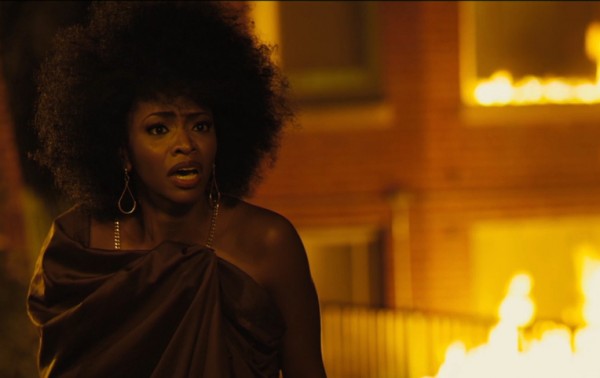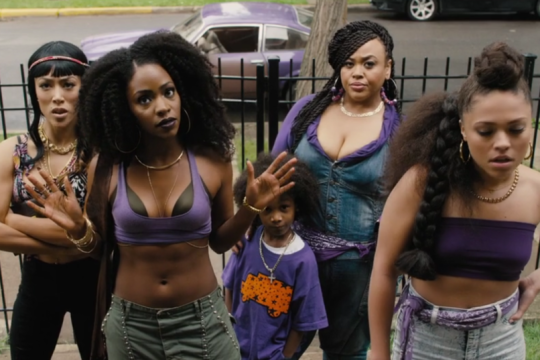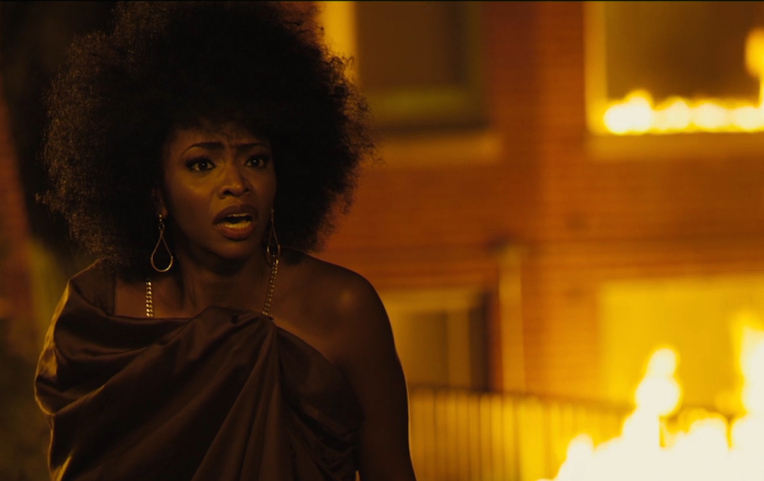
Imagine Lysistrata—the classical play you probably read in Greek Lit class —but in the hood.
In this fictional but all-too-real version of Southside, Chicago, the women of Chi-Raq, lead by Lysistrata (Teyonah Parris), opt to withhold sex as a negotiating method to force an end to the gang related violence their men engage in. Lysistrata is inspired by the story of Leymah Gbowee, a Liberian woman who organized a sex strike amongst her peers to end a gruesome civil war. Her efforts were successful and earned her the Nobel Prize. The purpose of the Chi-Raq women’s strike is not so much to save their men from themselves as it is to bring a stop to the stray bullets that kill innocent children caught in the crossfire. These female revolutionists consider their responsibility to put children first an unwritten condition of womanhood. While Lysistrata herself is not a mother, her solidarity with them over her gang leader boyfriend, whom she loves, is powerful.
Is the labor of the Chi-Raq women’s strike itself a sort of sex work? As a sex worker myself, I have a very liberal definition of what falls under that (red) umbrella. I consider any situation where sex is used as a means of negotiation to be a form of sex work. Cash exchange is not a requirement. This definition can include negotiations between married couples or any suggestion of potential future sex to get what you want in the now—what some might call “flirting.” I understand this is a controversial opinion and an incredibly broad demarcation of sex work. But the reason I keep my definition of sex work so broad is because it normalizes the behavior. The more parallels I can draw between prostitution and sexual labor within civilian relationships, the weaker the arguments for intimate labor being an inherent evil become. This also means that when I work, I feel no guilt over avoiding terms such as “escort”—which would get me targeted by law enforcement—in favor of “sugarbaby” or “spoiled girlfriend”—even though nine times out of 10 they mean same goddamned thing, just without leaving me subject to the same legal implications.
The women of Chi-Raq considered themselves activists, and peaceful ones at that, but they still end up facing federal charges for their disruptive behavior. “Activists” sounds much better than “pissed off girlfriends.” There exists near infinite terminology to frame sexual negotiations depending on the conditions in which you negotiate. As the leader of this unconventional protest, Lysistrata is careful in navigating PR—it is her articulation of the dire circumstances in which the neighborhood lives, in addition to her resolve, that makes her a force to be reckoned with as opposed to being considered a joke, or worse, a terrorist. Different titles for the same actions produce vastly different outcomes.

There’s a lot else to think about and love when it comes to this film. It’s hilarious, with a very dapper Samuel L. Jackson narrating (I vote to have him narrate all films from now on), an adorably deranged Wesley Snipes, and a powerful Angela Bassett. But the real shocker is Nick Cannon, actually convincing as a hard-core gangster. I will warn you of one major disappointment before you get your hopes up: Jennifer Hudson has a major role but does not sing. Yes, I will repeat: Spike Lee had the audacity to put Jennifer-freaking-Hudson on camera, and yet she does not belt out a single note throughout the course of the film. I even sat through the credits, hoping to hear her. Nothing. However, the film does please with both subtle and overt nods to current events in Black America, from a symbolic ode to Bree Newsome to a beautifully poignant Ben Carson diss.
This film is unequivocally pro-Black and pro-Chicago, but for some the title alone is considered an embarrassment. In my opinion, referring to Chicago as “Chi-Raq” is not dramatizing reality, it is reality. More young black men have died fighting on the streets of Chicago than the total number of American armed forces killed in Iraq in the same time period. Black America is keen to de-emphasize issues that seem self-inflicted (such as gang violence) in favor of bringing attention to those that are more external (such as police violence and gentrification). This is completely understandable: black-on-black crime statistics are constantly used to derail discussions on race and undermine community activist efforts. Lee does not feed the myth of gang involvement as something people do because it’s “cool.” His film makes it clear that these gangs are a survivalist response to poverty. His characters’ life of crime is not glorified, it is reflexive. Instead of trying to erase the reality of violence in our community, we should take a more informational approach—drawing the links between failing public schools, a lack of living wage jobs, and systemic racism as the incubators for criminal enterprize, not the other way around. Chi-Raq should make people uncomfortable, not because it undermines Black America, but because it forces us to incorporate those troublesome “thugs” we try to sweep under the rug into our larger plan for community revitalization.
The degree of Sisterhood in Chi-Raq will make you want to call every friend from high school, your mom, and about a dozen cousins you haven’t seen in way too long. I cried, twice. Lee brought it way back: apparently the endearment “Ace Boon Coon” is getting a revival, along with new favorites such as “that bitch is badder than my credit score” and “peace, peace and hair grease!” (It’s not too late to put that on your Christmas cards.)
Solidarity is a much stronger theme in this film than the “pussy is power” emphasis that seems to initially be the force behind the action.

Don’t get me wrong—Pussy IS Power. The male characters go insane without it in a pathetically short period of time. Their desire traps them into ludicrously bad decisions—wait, that’s hardly news. What might be a bit surprising is what an incredibly sex-positive community Chi-Raq is. In one of the opening scenes, Lysistrata is shown taking birth control, something the media doesn’t often depict in a positive light for young women of color. Women of all sizes, younger and older, are all shown claiming sexual desire themselves. This is not a film where the girl with measurable sex drive is some sort of unicorn character brought in to lump on bad stereotypes and jokes drier than my own pussy is when I hear them. It is considered a given that the women themselves are forgoing things they desire—sex and intimacy—in joining the strike.
So, is Lysistrata leading an army of prostitutes for peace? While the women are on strike, it is made abundantly clear to the male characters that sex and intimacy will be yours—all for the price of signing a peace treaty. Even actual sex workers—strippers—stop showing up for work at the local strip club, joining in the strike. Faceless women referred to as “hoes” and “thots” are on strike too, as are the neighborhood’s gay men who cater to those “on the down low.” Workers who normally trade intimacy for money are now withholding intimacy to trade instead for peace. Since these situations are mentioned but not elaborated on, there is no real explanation as to how these people support themselves for the full three month strike.
This omission is absurd. After all, the film acknowledges that the strike alone is not sufficient to bring about the long term solutions required to turn young black men away from gangs. Gang black market transactions are an economic survival strategy in a city where 42% live below the poverty line, with 21+% unemployment. As part of the peace treaty, everyone in the community is offered an above minimum wage job at a selection of Fortune 500 companies. So, Chi-Raq acknowledges the consequences of attempting peace without economic stability, but fails to account for the economic instability suffered by those who rely on sexual labor for income for the duration of the strike. For all its social foresight, Chi-Raq fails to understand that this strike costs some workers a lot more than others. The film even suggests a parallel between strippers not showing up to work and “thots” not going out clubbing—if these “thots” are non-professionals, the movie is likening going to work in a strip club to going out to party.
And this is exactly where the critical difference lies between we sex workers and more informal performers of intimate labor: desire. In a society with complicated sexual politics such as ours, women do indeed have unique power in sexual negotiations. What draws the line between formalized sex work and casual sexual barter is that desire. Most of the women in Lysistrata’s army desire sex themselves. They miss intimacy. The word “horny” is used self-referentially. This is not about women holding something over men which they want in exchange for something the women want. This is women choosing to make a sacrifice of something they enjoy for something they need more.
In contrast, I don’t desire sex with my clie—*cough* sugardaddies, I only desire their resources. Withholding sex until I get what I want isn’t a condition for moving forward so much as it is the entire relationship. I sacrifice nothing in the way of intimate needs if I hold off on sex until I get my way.

I expected the plot to lean on old tropes, with wives and girlfriends who considered sex a chore—something they could casually revoke. Instead, the women of Chi-Raq withhold sex for an incredibly powerful cause: to save the lives of children and end violence. It was not a decision they came to lightly, and it takes some serious convincing for some (apparently, in Chi-Raq, every man’s dick game is on point). Ultimately, this is not sex work. It is sexual negotiation, but in no other way is it sexual labor.
Which raises a lot of questions: First off, has it been THAT long since I’ve had a truly good lay that I can’t even comprehend why other women still fuck simply for the sake of it? Or is that how sex work “ruins” you—you learn just how much you can get for giving it up. Even if the sex itself does please you, if there is more to get…why not take the money too?
And what does that mean for Lysistrata and her followers, and for every other civilian who becomes aware of their casual sexual labor? Now they know just what they can accomplish simply by withholding sex. While they aren’t sex workers, will they be “ruined” as well by learning the full extent of their power? The threat of another sex strike will always loom in Chi-raq’s fictional universe. Is desire enough to stop the women from ever considering negotiating sex to manipulate their partners’ behavior ever again?
The heaux in me doubts it.
